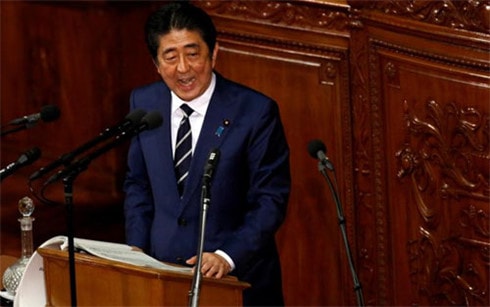Visiting the US, what did Japanese Prime Minister Abe bring to his long-time ally?
Japanese Prime Minister Shinzo Abe will hold talks with US President Donald Trump today, February 10.
Japanese Prime Minister Shinzo Abe will propose government-level US-Japan talks on trade, security and macroeconomic issues, including currency, when he meets US President Donald Trump on Tuesday (February 10), a Japanese government official involved in the agenda said.
Japanese Prime Minister Shinzo Abe arrived in Washington late Thursday (February 9). The trip promises to strengthen relations between the two countries, which have been allies for decades.
 |
| Japanese Prime Minister Shinzo Abe delivers a policy speech before the Japanese Parliament on January 20, 2017 (Photo: Reuters). |
Reuters quoted Japanese Chief Cabinet Secretary Yoshihide Suga as saying to reporters: "In the context of increasingly serious security relations in the Asia-Pacific region, the sustainable US-Japan alliance is important both at home and abroad."
"This is the most important topic of the US-Japan summit," Suga said, adding that it is also important for the two sides to have constructive discussions to create a "win-win" relationship in the US-Japan economic relationship.
US President Donald Trump said that Japan, China and Mexico are the countries that cause the US trade deficit, and accused Tokyo of using monetary policy to devalue its currency to boost exports.
"We are using monetary easing, fiscal policy and structural reform to get out of deflation. We are not deliberately devaluing the domestic currency for competitive purposes or for any other purpose," Masahiko Shibayama, an adviser to Prime Minister Abe, told Reuters.
"We will explain based on the fact that auto manufacturing in Japan is contributing to the creation of American jobs through their local subsidiaries."
During his election campaign, Mr. Trump complained that Tokyo did not fully share the costs of protecting America's security, although Defense Secretary Jim Mattis affirmed the strong alliance with Japan when he visited the country last week.
Joining Japanese Prime Minister Shinzo Abe on his visit to the US this time are Finance Minister Taro Aso and Foreign Minister Fumio Kishida. According to a government source, the trip promises to bring 700,000 job opportunities to the US through a public-private infrastructure investment package such as high-speed trains.
US President Trump has announced the withdrawal of the US from the Trans-Pacific Partnership (TPP), and made it clear that he wants a bilateral free trade agreement (FTA) with Tokyo instead.
Japanese Prime Minister Shinzo Abe has left the door open to FTA talks with the US, but Japanese officials worry such talks could increase pressure on sensitive areas such as agriculture, bringing little economic benefit to Japan.
Tokyo and Washington already have a government-level mechanism for security talks, the “2+2” talks between defense and foreign ministers.
The economic framework agreements will be led by Japanese Deputy Prime Minister Aso and US Vice President Mike Pence, and will address a range of issues, with a focus on trade policy and measures to promote job creation on the US side, an article published in the Nikkei business daily said.
Japanese Prime Minister Abe is likely to propose creating very liberal rules for trade and investment in areas such as intellectual property protection, rules of origin, regulations on state-owned companies and e-commerce, the Nikkei article said.
Japan hopes such bilateral rules would be similar to those outlined in the TPP and could be extended to the Asia-Pacific region.
The two countries are also preparing statements on economic and security cooperation to be released after the summit, Nikkei reported.
Japanese Prime Minister Abe and US President Trump will also play a round in Florida this weekend after meeting at the White House on Friday. Mr. Trump said he wanted to ensure that the Japanese leader was his partner on the playing field, not a competitor./.
According to VOV
| RELATED NEWS |
|---|
